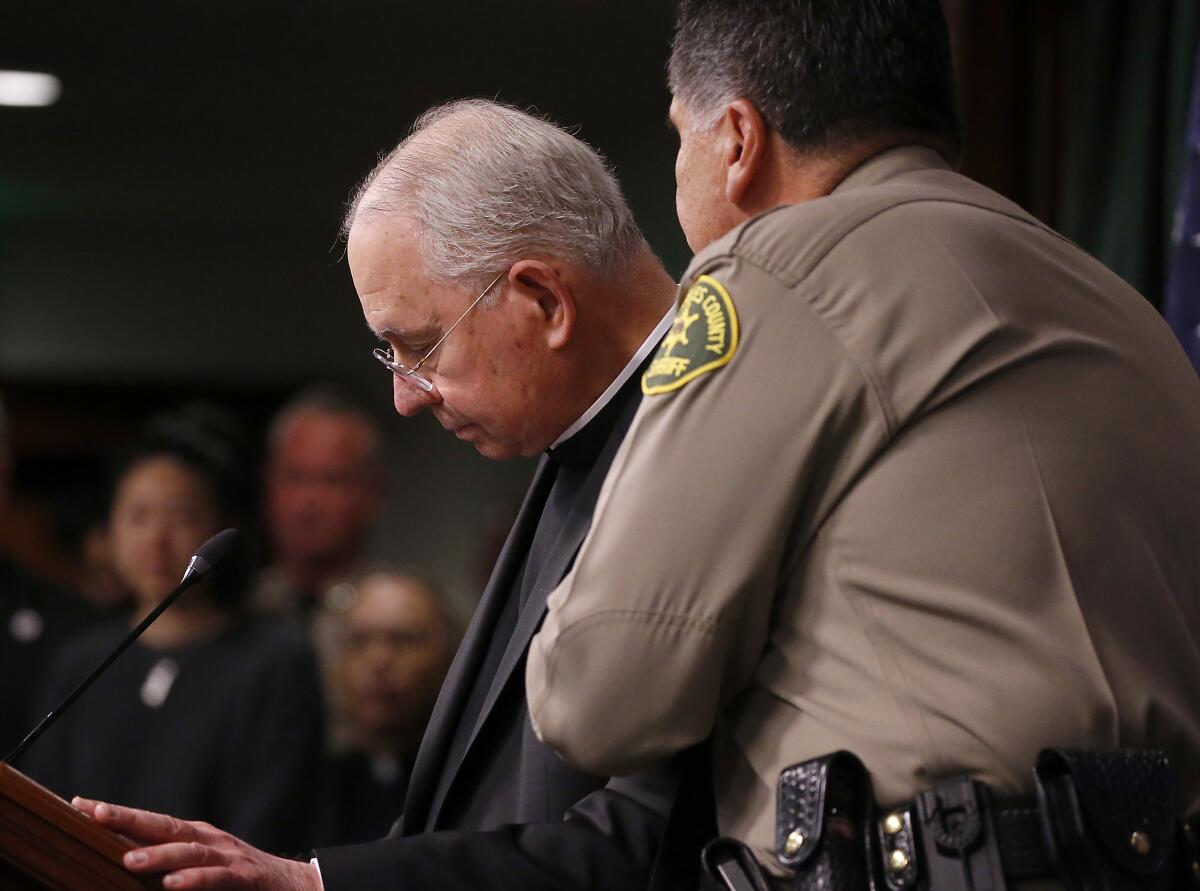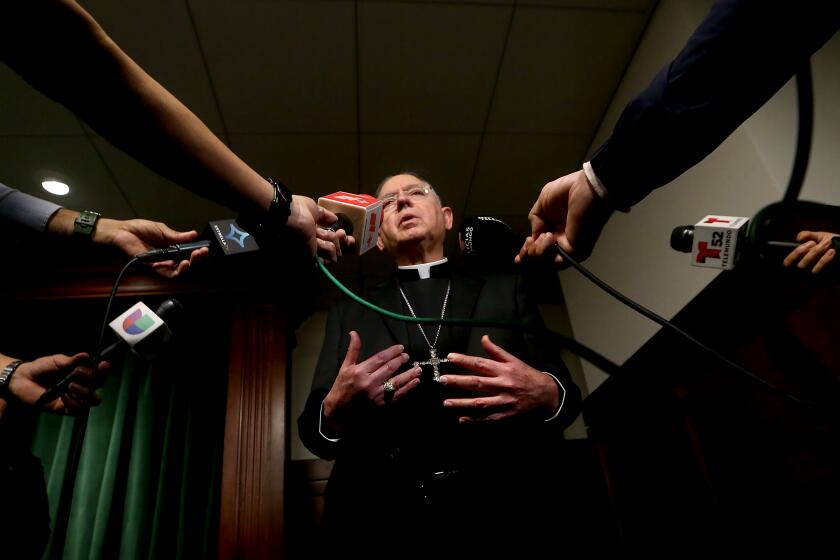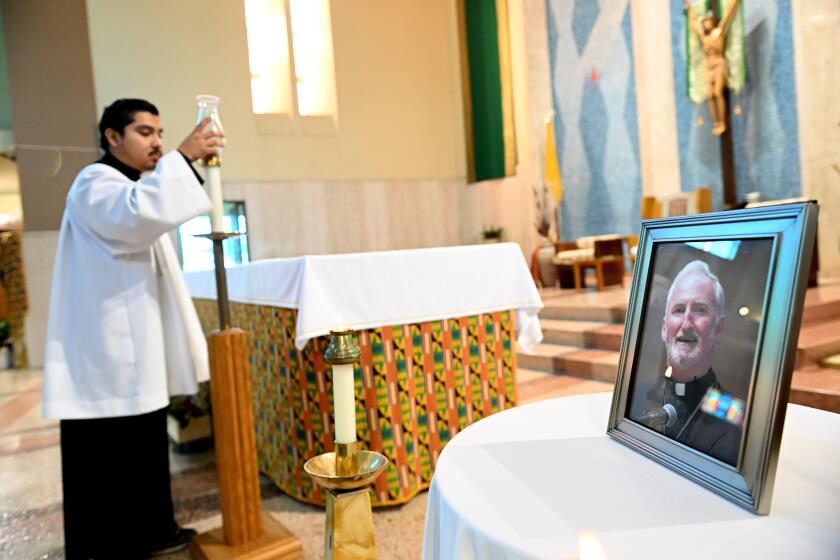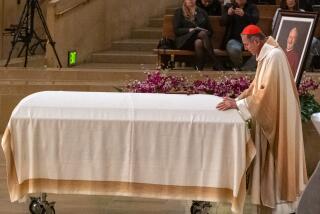Housekeeper’s husband is arrested in slaying of L.A. Bishop David G. O’Connell

- Share via
Authorities have arrested the husband of a woman who worked as a housekeeper for Auxiliary Bishop David G. O’Connell in connection with the slaying of the beloved Los Angeles cleric, officials said Monday.
Los Angeles County Sheriff Robert Luna identified Carlos Medina as the suspect in the slaying. He did not cite a motive but said a tipster had told authorities Medina was acting strangely after the killing and claimed that the bishop owed him money. Luna said Medina is 65; however, jail records show the suspect as 61. He is being held in lieu of $2-million bail.
Luna said detectives connected Medina to the crime from a surveillance video that showed a vehicle at the O’Connell home about the time of the killing, a “dark, compact SUV.” Weapons were found at Medina’s home in Torrance, and Luna said ballistic tests are pending.
Revelations about the shooting came during an emotional afternoon news conference in which officials and Los Angeles Archbishop José H. Gómez lauded O’Connell for his friendship, his selflessness and his focus on the community he had loved and served for decades.
“He was the help of the helpless and the hope of the hopeless,” said Los Angeles County Supervisor Janice Hahn, who described O’Connell as a longtime friend. “He knew that serving God meant serving man.”
The suspect in Bishop David O’Connell’s shooting death is married to the clergyman’s housekeeper.
O’Connell, 69, was killed Saturday afternoon in the Catholic archdiocese-owned home in Hacienda Heights where he lived alone. Luna said the bishop was found in his bedroom with “at least one gunshot wound to the upper body.” He said no firearms were recovered at the scene, and there was no sign of forced entry.
Deputies answering a call for a medical emergency shortly before 1 p.m. Saturday found O’Connell. Paramedics pronounced him dead at the scene. A couple living on the quiet, tree-lined street said they heard no gunshot or other unusual noise before the arrival of firefighters and ambulance crews.
Asked about who called 911 to report the incident, Luna said he believed a church deacon had gone to O’Connell’s home to check on him after O’Connell was late for a meeting. The sheriff also was asked whether authorities have spoken to the housekeeper.
“The detectives are absolutely interviewing her,” Luna said. “As far as we know at this time she’s been fully cooperative.”
Luna said homicide and major crimes detectives worked around the clock in the 48 hours since the bishop’s killing to find the suspect.
“We apprehended him by some amazing detective work,” he said. “Our next priority is to get him prosecuted.”
Gómez fought back tears as he spoke about O’Connell, whom he remembered fondly for his fluent Spanish spoken with an Irish accent.
The archbishop called O’Connell “a good friend of Los Angeles” and said that “every day he wanted to show compassion to the poor, to the homeless, to the immigrant and to all those living on society’s margins. He was a good priest, a good bishop and a man of peace.”
The archbishop’s voice began to quaver as he talked about what a grave loss his friend’s death is and how grateful he is to Luna and the investigative team “for their hard work in bringing the suspect into custody.”
Then he began to break down, and the sheriff consoled him.
“Sorry, Bobby,” Gómez said, calling it a “sad and painful moment for all of us. ... Please keep praying for Bishop David and his family. Also pray for law enforcement officials as they continue the investigation.”
The killing of Los Angeles Bishop David G. O’Connell brings disbelief and mourning.
State Sen. Bob Archuleta, a former Pico Rivera mayor who served on the Montebello police force, said during the news conference that O’Connell “touched all of us,” calling him “our bishop, your bishop.”
He said O’Connell “had an ability to walk the streets, everywhere he went bringing people together with clergy, bringing other priests together, bringing families together, gang members together. He brought everyone together. He was truly a man of the cloth.”
Supervisor Hilda Solis said her “heart is broken.” O’Connell’s death “really hits home for some of us,” she said, because he “was a personal friend and someone who was very valiant and some one who cared for our community, especially the immigrant community. I came to know him because of his passion in helping pass immigration reform.”
O’Connell served as founder and chairman of the interdiocesan SoCal Immigration Task Force, helping scores of children who entered the United States without adult companions.
“For me, it really is a labor of love,” he said in a 2019 article. “This is, I think, what our schools and parishes are all about. Not just for unaccompanied minors but for all our children. There’s an epidemic of hurting children, even the ones who have too much. They feel we’ve abandoned them. And the migrant youths have become a metaphor for our whole society.”
In the 1990s, O’Connell gained a reputation for seeking to bridge relations between residents of riot-torn neighborhoods and local law enforcement after the police beating of Rodney King.
Peter Dreier, a professor of urban politics at Occidental College and author of “The Next Los Angeles: The Struggle for a Livable City,” remembered O’Connell as a progressive community organizer who put his personal charm to work for the poor and disenfranchised.
“I was always impressed with Father Dave’s street smarts, compassion, and willingness to challenge people in power around a variety of issues, including immigrant rights, housing justice, racism, and public safety,” Dreier wrote in a Facebook post. “He saw the church as a vehicle for social justice.”
Parishioners at St. Frances Xavier Cabrini Church in South Los Angeles, where O’Connell served for more than a decade, recalled a man with humor, a deep commitment to social justice and dedication to serving Black and Latino communities. They were stunned and struggling to make sense of the violence that claimed the life of someone whose calling was rooted in peace and love.
Jarlath Cunnane, pastor at St. Cornelius Catholic Church in Long Beach, met O’Connell more than 50 years ago at All Hallows College in Dublin, where they studied to become priests.
They bonded over shared interests — both studied English while at university — and Cunnane quickly came to appreciate O’Connell’s ability to deliver the perfect joke or quick-witted comment in almost any situation.
Both men moved to California, and their friendship grew deeper with the years. In 2020, when Cunnane was hospitalized for several weeks with a blood infection, O’Connell visited him almost every day. Cunnane was on an oxygen machine at the time and had a terrible taste in his mouth, he recalled, so O’Connell almost always brought him a kombucha drink when he visited.
“He had a great capacity for friendship,” he said.
The two friends met for dinner Thursday to catch up, Cunnane said, and they discussed plans for Cunnane to visit some parishes in O’Connell’s region in the near future. His longtime friend had not expressed worries about his safety, Cunnane said, so he was stunned when he learned that he’d been shot to death.
“Who on Earth would ever want to do this?” he asked.
Times staff writer Michael Finnegan contributed to this report.
More to Read
Sign up for Essential California
The most important California stories and recommendations in your inbox every morning.
You may occasionally receive promotional content from the Los Angeles Times.















